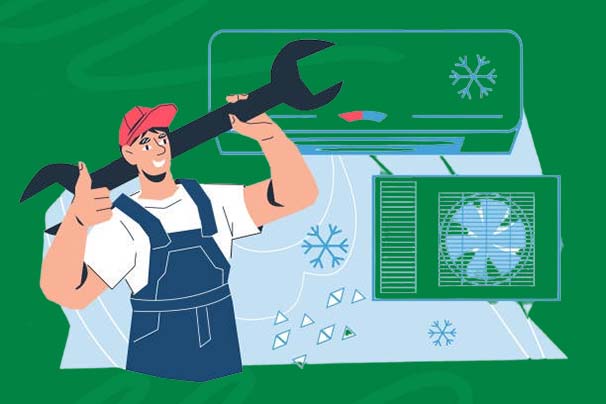Does Home Insurance Cover AC Units? Navigating the complexities of home insurance coverage can often feel like trying to find your way through a maze, particularly when it comes to determining whether specific items or systems in your home are covered. Among the various concerns homeowners may have, understanding the coverage for air conditioning (AC) units stands out as a common and crucial question.

AC units are indispensable for comfort during the sweltering months of summer, but they can also represent a significant financial investment. I will be shedding light on the intricacies of home insurance policies concerning AC units. In addition, guiding you through the conditions under which your system may or may not be covered.
Does Home Insurance Cover AC Units?
Whether home insurance covers air conditioning (AC) units largely depends on the specifics of the policy. Also the cause of damage or loss. Generally, homeowners insurance provides coverage for AC units under certain conditions. This is categorized under the dwelling or personal property coverage and considers the cause of damage, such as:
Dwelling Coverage:
This part of a home insurance policy usually covers the structure of your home and anything attached to it. This includes built-in appliances like central AC units. If the AC unit is damaged due to a covered peril such as fire, hail, or vandalism, it may be covered for repair or replacement.
Personal Property Coverage:
If you have a portable or window AC unit, it is typically covered under personal property coverage. This part of the policy covers the contents of your home, but again, coverage depends on the cause of damage being a listed peril in your policy.
When Does Home Insurance Cover AC Units?
Here are situations and scenarios where you will or can receive coverage for your air conditioning units with a homeowners insurance policy:
Covered Perils:
- Natural Disasters: Damage from events like lightning, windstorms, or hail is often covered.
- Vandalism or Theft: If your AC unit is stolen or intentionally damaged.
- Fire: Damage from house fires is typically covered, including AC units.
- Explosions: Damage from explosions, whether internal or external.
Type of AC Unit:
- Central AC units are usually considered part of the home’s structure and are covered under dwelling coverage.
- Portable or window units might be covered under personal property coverage.
When Do You Not Receive Coverage?
Here are situations where you will not be getting covered with your home insurance quote:
- Wear and Tear: AC units deteriorating from aging or general wear and tear are not protected under home insurance.
- Poor Maintenance: Home insurance excludes coverage for damage or malfunctions resulting from inadequate maintenance.
- Intentional Damage: Any deliberate harm inflicted on your AC unit will not be covered.
- Specific Exclusions: Certain policies may explicitly exclude coverage for specific kinds of damage or directly exclude AC units.
Additional Coverage Types for AC Units
The scope of coverage for your air conditioning system under a typical homeowners insurance policy may vary widely. Nevertheless, you have the option to incorporate supplementary coverage to ensure a more fortified insurance plan.
Equipment Breakdown Coverage:
This additional safeguard can protect the vital systems and appliances within your home, such as the air conditioning and heating, ventilation, and air conditioning (HVAC) systems. It provides financial assistance for the repair or replacement of these systems and appliances should they malfunction due to causes not covered by standard perils.
Flood Insurance:
Conventional insurance policies often do not cover damages resulting from flooding. Opting for a flood insurance endorsement or a separate policy altogether can offer financial protection for your residence and its systems, like the AC unit, in the event of flood-related damages from storm surges or prolonged rainfalls.
Earthquake Insurance:
Standard homeowners insurance does not typically cover earthquake-related damage. You can add coverage for such events either through an endorsement or, for those living in earthquake-prone zones, a dedicated policy might be more appropriate.
Water Backup Coverage:
Damage due to water backup or sewage overflow is usually not covered under basic insurance policies. By including this endorsement, you gain coverage for damages arising from these specific risks.
How To File a Claim for Your AC
If your AC gets damaged and you are aware that your insurance quote offers coverage, here is how to file a claim:
Examine Your Policy:
Ensure you understand your policy’s coverage by reviewing it carefully before submitting a claim, to verify that it covers the type of damage your AC unit has sustained.
Capture Evidence:
Utilize photography or video recording to create a visual record of the damage, which will serve as proof.
Compile Maintenance Documentation:
Collect any documents or receipts that attest to regular maintenance of your AC unit, demonstrating its upkeep.
Initiate the Claim Process:
Reach out to your insurance provider to start the claim, supplying them with all required documents and details about the damage and how you have maintained the unit.
Evaluation Process:
Expect an insurance adjuster to visit and evaluate the extent of the damage, which will influence the compensation amount according to your policy’s terms.
Proceed with Fixes or Replacement:
Following claim approval, you may begin the repair or replacement of your AC unit as per your insurance company’s guidance.
Understanding how home insurance applies to AC units, recognizing what is covered and what is not, exploring additional insurance options, and knowing the claims process can equip homeowners with the knowledge needed to safeguard their investments more effectively.
